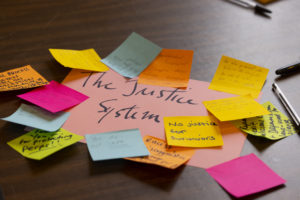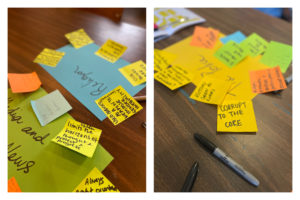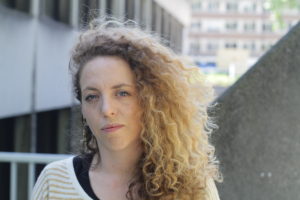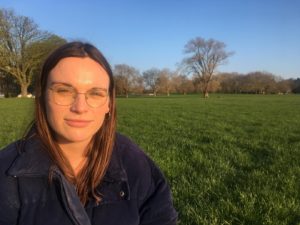A Place for Anger: An Interactive Space for Survivors at the Shameless! Festival

On Saturday 28 Nov, the SHaME team and WOW hosted the Shameless! Festival at Battersea Arts Centre in south London. Emma Yapp and Adeline Moussion, PhD Students with SHaME, ran their ‘Unpopular Opinions Workshop’, which they describe below.
Our idea was to offer a place for people who have experienced sexual violence to express anger, so as to challenge common expectations of them to tell their stories, perform victimhood, prove their wrongs, feed into voyeuristic consumption of their stories, or wait for recognition. The name of the workshop – echoing a Twitter ‘genre’ of public expression – was also set to challenge expectations that people who have experienced sexual violence should commit to institutional responses and be grateful for the support they get from them. Institutions are regularly shown to be harmful to survivors, but anger often disqualifies the people expressing it, especially when female or racialised. This space was about owning our anger and frustrations by focusing on public responses and their harms.

The interactive workshop was offered to share anger at institutional responses to sexual violence, and how sexual violence is treated in our society. Posters with the name of major institutions – the justice system, the police, medical professions, psychiatry, psychology, school system, social work, religion, the media – were scattered around the room and people were free to interact with each poster by writing their anger down on post-it notes. No verbal interaction or disclosures were needed, and people could come and go, or stay a bit longer and talk with us.

The response to this workshop was overwhelming, and nearly brought both of us to tears. Spaces of expression are increasingly recognised as valuable to people who have experienced trauma, and this was no exception. Making sure we provide space to people who have experienced trauma to be free to express their negative experiences is also important, to balance social expectations that their expression exists to educate others. We are exploring the possibility of running further workshops with people who have experienced sexual violence, but in the meantime, we continue to express our anger and frustration.
 Adeline Moussion joins SHaME as a doctoral student. She was formerly a student at the EHESS (MA Anthropology) and the ENS Lyon (MA History of Philosophy). Her PhD is an anthropological study of socio-medical support for victims of sexual violence in two French organizations. Read more about her research here.
Adeline Moussion joins SHaME as a doctoral student. She was formerly a student at the EHESS (MA Anthropology) and the ENS Lyon (MA History of Philosophy). Her PhD is an anthropological study of socio-medical support for victims of sexual violence in two French organizations. Read more about her research here.
 Emma Yapp joins SHaME as a doctoral student. She was formerly employed at King’s College London as a research worker on projects about domestic and sexual abuse and mental health, and comes from a background in Philosophy and Psychology. Her PhD explores how psychiatric evidence about survivors of sexual violence is used in court proceedings in England and Wales. Read more about her research here.
Emma Yapp joins SHaME as a doctoral student. She was formerly employed at King’s College London as a research worker on projects about domestic and sexual abuse and mental health, and comes from a background in Philosophy and Psychology. Her PhD explores how psychiatric evidence about survivors of sexual violence is used in court proceedings in England and Wales. Read more about her research here.